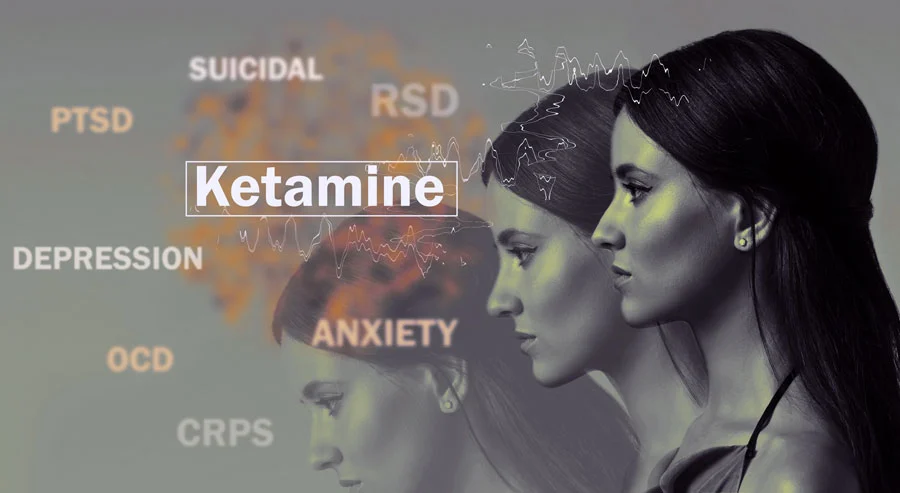Get Details on Ketamine Treatment for Depression and its Limitations
Anyone who has experienced depression knows the struggle that comes with treating it.
Depression is one of the most common mental illnesses in the world, impacting as much as 18% of adults in the United States at one point in their lives. It’s a complicated issue that doesn’t have a single pill or treatment that can solve it entirely, so getting help with your depression can seem like an uphill battle.
Ketamine treatment for depression is one of the newer strategies for addressing depressive symptoms. Doctors hope that it can provide faster relief with fewer side effects than existing options. But how well does ketamine work for depression, and how long does it last?
If you’re suffering from mental health conditions like treatment-resistant depression, anxiety, or addiction, South Shores Detox can help. Their comprehensive treatment programs include individual and group therapy options to help you cope with depression and receive the treatment that’s right for you. Dual-diagnosis programs can also address coexisting addictions that are used to cope with depressive symptoms.
Keep reading to learn more about ketamine’s effects on depression and how South Shores helps you get the treatments you need.
What Is the Ketamine Craze All About?
Ketamine hydrochloride, or ketamine, is a synthesized drug that’s commonly used as an anesthetic due to its dissociative and hallucinogenic effects. It’s been primarily used in hospital settings because it causes immobility, pain relief from its disassociative properties, and overall sedation. These effects allow doctors to prepare patients for surgery, manage chronic pain, or help them recover afterward with minimal discomfort. However, it’s also used as a standalone treatment for treatment-resistant depression.
Ketamine is a Schedule III substance that requires a prescription to use it legally. But, it’s also illegally used recreationally, often coming from veterinary hospitals and other less-secure sources because it can’t be created outside of a lab like street drugs.
How Is Ketamine Taken?
Clinical forms of ketamine are usually taken intravenously through an IV, which includes hospital settings and ketamine clinics that provide ketamine infusion therapy to patients. IV ketamine has a direct line to the bloodstream, allowing the effects to start sooner in time-sensitive situations like operating rooms.
Only a nasal spray, Spravato, is FDA-approved as a depression treatment that can be prescribed to patients. It’s used on a weekly basis for maintenance after using it twice weekly to begin treatment. Other forms and uses, like pills and lozenges, are off-label, which means they can be less effective or come with additional side effects.
What are the Most Common Side Effects of Ketamine?

As a dissociative sedative and hallucinogen, many of ketamine’s effects relate to your brain and cognition. It can create positive feelings, reduce negative feelings, or cause concerning symptoms that may put your health at risk.
Ketamine can cause:
- A sense of detachment
- Reduced pain
- Relaxation
- Fatigue
- Clumsiness
- Anxiety
- Increased heart rate
- Hallucinations
When taken responsibly, these effects are generally mild and will resolve on their own. However, overdosing on ketamine is possible and highly dangerous.
Ketamine overdose may cause:
- Depressed breathing
- Blurry vision
- Psychosis
- Delirium
- Paranoia
- Loss of consciousness
- Seizures
Fortunately, ketamine doesn’t cause intense respiratory distress like opioids, so the immediate risk of taking too much isn’t as high. However, you should always use ketamine responsibly and according to your doctor’s instructions.
How Does Ketamine Work for Depression?
Ketamine therapy being used to treat mental health concerns and depression is a much more recent treatment than using it as an anesthetic, so the exact science behind its therapeutic effects isn’t entirely clear yet. However, scientists believe it has to do with glutamate, a neurotransmitter responsible for stimulating neurons in your brain.
Ketamine binds to receptors that increase the amount of glutamate that is available to your brain. It can then use this excess glutamate to stimulate the formation of new neural connections and increase brain cell growth. It’s believed that depression can degrade your neural connections over time due to the stress it causes on your brain, which ketamine can help repair over time.
One of the parts of the brain that benefits from an increase in glutamate is the prefrontal cortex, which regulates your mood and emotions. Stronger neural pathways in this area can make it easier to cope with stress, overcome strong emotions, and lessen the cognitive effects of depression.
The Known Benefits of Taking Ketamine for Depression

Addressing treatment-resistant depression often requires multiple treatments, including therapy, psychiatry, medication management, and alternative treatments like ketamine infusion or transcranial magnetic stimulation. Selective serotonin reuptake inhibitors (SSRIs) are often the first line of defense along with therapy. However, antidepressants can take eight or more weeks to stabilize in your bloodstream and work effectively.
Ketamine’s effects are much faster, taking hours instead of weeks to feel the benefits so you can cope with depression symptoms more easily. You also only have to receive injections or use the spray twice per week at the start before moving down to once a week or every few weeks for maintenance doses instead of taking antidepressants daily.
How Is Ketamine Taken for Depression?
Ketamine treatment for depression comes in two types: FDA-approved and off-label uses.
Spravato is the only FDA-approved form of ketamine treatment prescribed specifically for depression. It comes in a metered nasal spray that delivers the dose through the blood vessels in your nose, slightly delaying the effects compared to other methods, but making it easy to dose correctly.
Off-label uses of ketamine include IV injections, lozenges, and tablets. However, injections are not usually prescribed for use outside of treatment centers or hospital settings. You can receive ketamine infusions at a treatment facility where you’ll be monitored during your treatment, or you may receive a ketamine troche, lozenge, or pill to take under supervision at a psychiatrist’s office or medical setting.
Recreational use includes any form of ketamine, including powders that are sold on the street to be snorted or added to other drugs in capsules. Using ketamine illegally to treat depression is especially dangerous because of the risk of it being cut with more dangerous drugs like fentanyl or heroin.
How Long Do Ketamine Treatments Last?
Ketamine treatments are more convenient than other forms of treating depression, but their effects need to be stable and last a long time to be most effective.
Unlike antidepressants, ketamine doesn’t need to build up in your bloodstream for months before it works, and you don’t need to maintain high levels of ketamine for extended periods of time to feel the positive effects. Instead, ketamine works to repair your brain and improve symptoms during the initial period of six or more weeks. These effects give your brain the capacity to deal with the emotions that are associated with depression, helping you avoid symptoms and reducing the need for more treatments. Unfortunately, they aren’t usually permanent.
IV ketamine therapy has been shown to maintain positive effects for a month with a single dose, and multiple months after the initial loading phase of treatment. Oral applications like lozenges and pills, as well as Stravato, are not as long-lasting, generally requiring maintenance doses each week or every two weeks.
How to Extend the Positive Effects of Ketamine Treatment
While there’s no chemical method of extending the effects of ketamine therapy, you can work to maintain and extend the benefits by taking other steps toward improving your mental health.
Working with a psychiatrist to receive additional medication management like an antidepressant alongside your ketamine treatment can lower your need for maintenance doses and improve the long-term effects. Therapy can also help by changing the way you think and process stress, emotions, and thoughts so they’re less likely to have a significant impact on your mental health and contribute to your depression.
What to Expect from Ketamine Treatment

Your experience receiving ketamine therapy will vary depending on how the ketamine is administered, how long you’ve been treated, and where you’re taking it.
Generally, intravenous ketamine will be administered in a treatment facility where a doctor will inject the ketamine and monitor you. You’ll feel the cognitive effects within 20 minutes, including potential dissociation and hallucinations, and they’ll slowly dissipate over the next few hours. You may feel lightheaded, dizzy, nauseous, or anxious after your first experience with IV ketamine as you adjust to the effects of the treatment.
Ketamine pills and lozenges can be administered under a doctor’s supervision or on your own. You may begin by having a specialist monitoring you for the first few doses while you get used to the feeling and learn what to expect. However, they don’t often require doctor supervision, so you can begin to give yourself infrequent doses.
Spravato is used at a doctor’s office for monitoring. Spravato takes longer to kick in, usually around 40 minutes and wears off within two hours because it’s absorbed less efficiently through the nasal passages.
Does Insurance Cover Ketamine Treatments?
Ketamine treatment comes in multiple forms – and most of them are expensive without appropriate insurance coverage.
In most cases, ketamine therapy prescriptions for pills, lozenges, and a nasal spray will be covered as part of your treatment. However, insurance companies commonly deny coverage for a ketamine infusion because of the high cost of attending a private practice and its off-label use case.
What are the Potential Risks of Ketamine Treatments?

Ketamine infusion has a number of benefits, including faster depression relief and fewer doses. Unfortunately, there are also some downsides of ketamine therapy to consider before beginning a new depression treatment plan.
One of the most significant risks of ketamine is the risk of developing a substance abuse disorder. Ketamine can cause euphoria in some people and at certain doses by acting on the opioid receptors and triggering the release of satisfying dopamine. Over time, habitual use of ketamine can cause you to build a tolerance and addiction to the higher doses you need to achieve the same feeling.
Ketamine’s psychological impact is also a concern for anyone with a history of psychosis, schizophrenia, mood disorders or dementia due to the hallucinogenic and dissociative effect it creates. The confusion can trigger strong emotional reactions and even make chronic mental health issues worse.
The sedative effects of ketamine can also be dangerous when taken in too high of a dose or combined with other sedatives like opioids. Depressed breathing can lead to respiratory distress in some cases, which is one of the more dangerous side effects of ketamine use.
Is Ketamine Safe for Long-Term Use?
While ketamine has been used as a short-term anesthetic for decades, we don’t have the same data for its use in treating treatment-resistant depression. It’s a relatively safe drug to take under doctor supervision and in smaller doses to help avoid developing a dependence or addiction, but misuse is common.
A 3-year study showed that Spravato helped prevent depression symptoms from returning for 16 months in some patients. It’s possible that low-dose, infrequent treatments have the potential to maintain an effective impact without serious side effects.
Another study showed that long-term IV ketamine use can lead to cognitive impairment in younger users whose brains are still developing.
There’s also evidence that long-term repeated ketamine infusions have a serious effect on the liver, which can cause multi-system issues, including more widely known bladder damage done by ketamine usage.
With a lack of definitive knowledge, it’s best to speak with your doctor to determine if ketamine is the best choice for you.
Can Ketamine Replace An Opioid Addiction?

Opioids and ketamine share some similar effects. They both help you calm down, numb the pain, and can produce euphoria, but ketamine is not an opioid.
If you’re suffering from an opioid addiction, ketamine may look like the perfect, safer alternative that you can switch to without an issue. However, if you’ve been taking a high dose or habitually using opioids for an extended period of time, you build a chemical dependence that can be dangerous and even fatal if you stop suddenly.
A medical detox with an addiction treatment center is the only effective way to overcome an existing addiction, especially to dangerous drugs like opioids. It’s possible that IV ketamine may be part of your treatment plan, but you shouldn’t assume that ketamine and opioids are chemically the same just because they’re similar in their side effects.
Get Guidance on Ketamine Use and Addiction Treatment with South Shores Detox
Ketamine offers a promising opportunity to help improve treatment-resistant depression symptoms. It works quickly, can last for a month, and may help you if you’re experiencing dangerous thoughts due to your depression without a strong potential for addiction.
However, ketamine is still a relatively new depression treatment, so it’s hard to know the long-term effects. Some studies showed cognitive decline in habitual users, while others found a significant improvement in symptoms of depression, making it a subjective treatment option.
If you’re suffering from a ketamine addiction or other addiction that’s covering up your depression, South Shores Detox has the resources and experience to get to the bottom of things. They’ll help you find the right program and treatment plan for your individual needs, including offering dual-diagnosis treatment that addresses the depression and addiction that often coincide.
Mental health is a crucial part of your overall health. Give yourself the best chance to overcome depression with an addiction and mental health facility like South Shores. Get in touch with a care coordinator today to learn more.
SOURCES:
- https://www.cdc.gov/mmwr/volumes/72/wr/mm7224a1.htm
- https://www.dea.gov/sites/default/files/2020-06/Ketamine-2020.pdf
- https://www.fda.gov/news-events/press-announcements/fda-approves-new-nasal-spray-medication-treatment-resistant-depression-available-only-certified
- https://www.health.harvard.edu/blog/transcranial-magnetic-stimulation-for-depression-2018022313335
- https://www.ncbi.nlm.nih.gov/pmc/articles/PMC6767816/
- https://pubmed.ncbi.nlm.nih.gov/31166571/
- https://www.ncbi.nlm.nih.gov/pmc/articles/PMC8519172/
- https://www.ncbi.nlm.nih.gov/pmc/articles/PMC7323839/

